Systolic murmurs - Study guides, Class notes & Summaries
Looking for the best study guides, study notes and summaries about Systolic murmurs? On this page you'll find 1542 study documents about Systolic murmurs.
Page 3 out of 1.542 results
Sort by
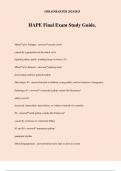
-
HAPE Final Exam Study Guide.
- Exam (elaborations) • 34 pages • 2024
-
- $11.49
- + learn more
HAPE Final Exam Study Guide. Mitral Valve Prolapse - answer*systolic click* caused by regurgitation of the mitral valve squatting delays quick, standing brings it closer to S1 Mitral Valve Stenosis - answer*opening snap* decrescendo and low-pitched rumble Physiologic S3 - answernormal in children, young adults, and last trimester of pregnancy Pathologic S3 - answer*ventricular gallop, sounds like Kentucky* adults over 40 decreased contractility, heart failure, or volume overload of a ve...
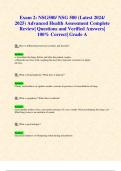
-
Exam 2: NSG500/ NSG 500 (Latest 2024/ 2025) Advanced Health Assessment Complete Review| Questions and Verified Answers| 100% Correct| Grade A
- Exam (elaborations) • 35 pages • 2024
- Available in package deal
-
- $10.99
- + learn more
Exam 2: NSG500/ NSG 500 (Latest 2024/ 2025) Advanced Health Assessment Complete Review| Questions and Verified Answers| 100% Correct| Grade A Q: How to differentiate between crackles and rhonchi? Answer: o Auscultate the lungs before and after the patient coughs. o Rhonchi can clear with coughing because they represent secretions in larger airways. Q: What is bronchophony? What does it indicate? Answer: Clarity and loudness of spoken sounds, extreme in presence of conso...
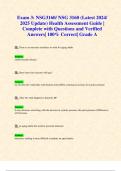
-
Exam 3: NSG3160/ NSG 3160 (Latest 2024/ 2025 Update) Health Assessment Guide | Complete with Questions and Verified Answers| 100% Correct| Grade A
- Exam (elaborations) • 48 pages • 2024
- Available in package deal
-
- $11.49
- + learn more
Exam 3: NSG3160/ NSG 3160 (Latest 2024/ 2025 Update) Health Assessment Guide | Complete with Questions and Verified Answers| 100% Correct| Grade A Q: There is an increases incidence in what for aging adults Answer: cardiovascular disease Q: Does heart size increase with age? Answer: no, but the left ventricular wall thickens and stiffens creating an increase in systolic pressure Q: After 60, what happens to diastolic BP Answer: it may decrease, and along with...
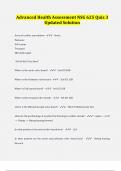
-
Advanced Health Assessment NSG 625 Quiz 3 Updated Solution
- Exam (elaborations) • 30 pages • 2024
- Available in package deal
-
- $12.49
- + learn more
How to apply diaphragm of stethoscope - - firmly When to use diaphragm of stethoscope - - with high pitched sounds i.e. valve closure, systolic events, and regurgitate murmurs When to use bell of stethoscope - - with low pitched sounds i.e. gallops, murmur, AV stenosis what happens to PMI in COPD - - shifts down and to the right What happens to the PMI during pregnancy? - - shifted upward 1-1.5 cm (about 1 space) heaves/lifts - - sustained forceful thrusting of ventricle d...
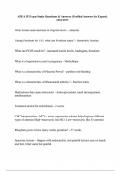
-
APEA 3P Exam Study Questions & Answers (Verified Answers by Expert) 2024/2025
- Exam (elaborations) • 22 pages • 2024
- Available in package deal
-
- $12.00
- + learn more
What would cause decrease in Digoxin levels - Antacids Taking Pyridium for UTI, what can Pyridium cause? - Hemolytic Anemia What can PCOS result in? - increased insulin levels, Androgens, hirsutism What is a hypertensive used in pregnancy - Methyldopa What is a characteristic of Placenta Previa? - painless red bleeding What is a characteristic of Rheumatoid arthritis ? - Red hot joints Medications that cause ototoxicity - Aminoglycosides, nasal decongestants, antihistamines Treatment peri...
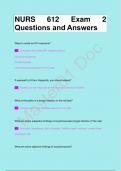
-
NURS 612 Exam 2 Questions and Answers
- Exam (elaborations) • 28 pages • 2024
- Available in package deal
-
- $12.49
- + learn more
These breath sounds are continuous, low-pitched snoring sounds caused by: airway obstruction from thick secretions, muscular contractions, or masses; long snoring sounds; located over the bronchi. ~ Rhonchi. Chest pain differential diagnosis? ~ Angina, MI, Pericarditis, Thoracic/abdominal aneurysm, GERD/PUD, Cholecystitis, Pancreatitis, Costochondritis, PE, pneumonia, pleurisy, tumor. Difficulty breathing/SOB differential diagnosis? ~ Heart failure, respiratory disease, liver disea...
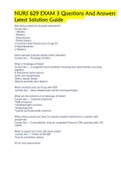
-
NURS 629 EXAM 3 Questions And Answers Latest Solution Guide.
- Exam (elaborations) • 6 pages • 2023
- Available in package deal
-
- $9.99
- 1x sold
- + learn more
NURS 629 EXAM 3 Questions And Answers Latest Solution Guide. Risk factors related to elevated cholesterol? Correct Ans :- · Obesity · Diabetes · Hypertension · Family history: o Coronary heart disease prior to age 55 o Hyperlipidemia o Diabetes Most common cyanotic cardiac lesion (disorder) Correct Ans :- Tetralogy of Fallot What is Tetralogy of Fallot? Correct Ans :- a congenital heart condition involving four abnormalities occurring together: 1) Pulmonary valve stenosis 2) ...
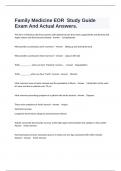
-
Family Medicine EOR Study Guide Exam And Actual Answers.
- Exam (elaborations) • 44 pages • 2024
- Available in package deal
-
- $10.39
- + learn more
This form of infectious diarrhea presents with abdominal pain that mimics appendicitis and diarrhea that begins watery and then becomes bloody - Answer Campylobacter What position accentuates aortic murmurs? - Answer Sitting up and leaning forward What position accentuates mitral murmurs? - Answer Lying on left side Think __________ when you hear "blowing" murmur.... - Answer Regurgitation Think _________ when you hear "harsh" murmur - Answer Stenosis Mo...
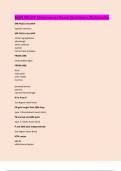
-
NGN NCLEX Mnemonics Exam Questions/Rationales
- Exam (elaborations) • 27 pages • 2024
-
- $12.49
- + learn more
MR PASS is the MVP systolic murmurs MR PASS is the MVP mitral regurgitation physiologic aortic stenosis systolic mitral valve prolapse FROM JANE endocarditis signs FROM JANE fever roth spots osler nodes murmur janeway lesions anemia nail bed hemorrhage
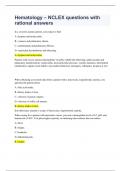
-
Hematology – NCLEX questions with rational answers
- Exam (elaborations) • 25 pages • 2024
- Available in package deal
-
- $9.00
- + learn more
Hematology – NCLEX questions with rational answers In a severely anemic patient, you expect to find A. dyspnea and tachycardia. B. cyanosis and pulmonary edema. C. cardiomegaly and pulmonary fibrosis. D. ventricular dysrhythmias and wheezing. A. dyspnea and tachycardia. Patients with severe anemia (hemoglobin <6 g/dL) exhibit the following cardiovascular and pulmonary manifestations: tachycardia, increased pulse pressure, systolic murmurs, intermittent claudication, angina, heart fail...

Study stress? For sellers on Stuvia, these are actually golden times. KA-CHING! Earn from your study resources too and start uploading now. Discover all about earning on Stuvia


